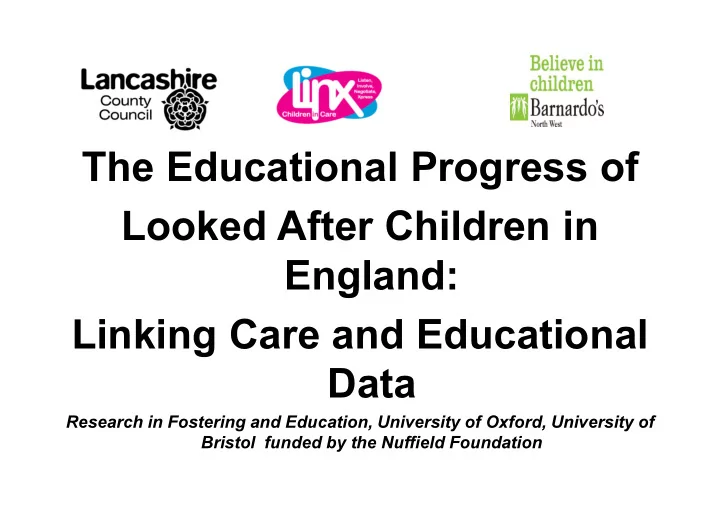

The Educational Progress of Looked After Children in England: Linking Care and Educational Data Research in Fostering and Education, University of Oxford, University of Bristol funded by the Nuffield Foundation
In March 2015, there were 69,540 looked after children in England
Seventy-five per cent of these children and young people were living in foster placements
Children who are, or have been, in care are one of the lowest performing groups in terms of educational outcomes internationally
Key Stage 1 aged 7 Percentage of Children getting the expected levels in Reading, Writing and Mathematics
Children in All Children care Reading 71% Reading 90% Writing 61% Writing 86% Maths 72 % Maths 92%
Key Stage 2 aged 11 Percentage of Children getting the expected levels in English Maths
Children in All Children care 48% 79%
The gap continues to increase as children get older
6% of care compared experienced with just people over 50% attend of young university people
Young people transitioning from care also have poorer job prospects and health outcomes than the general population
Care experienced young people are also over-represented in the homeless and prison populations
So what are some of the key findings from this report….
Young people identified the following factors…
The type of school you attend • Mainstream • Special school • Pupil referral unit
Absences exclusions changes of school Unauthorised absences were a major predictor of poorer scores
Teachers and school staff including, carers, teachers, and school pastoral support services
Support from members of birth family
Having someone whom they felt genuinely cared about them was very important to the young people in this study
Young people needed to feel that they would not be let down – which had been their past experience – and that their life mattered. It needed to matter to others before it could matter to them.
Most identified relationships with people to whom they felt gratitude and did not want to let down.
Lancashire Young People have identified negative stereotypes from peers at school as being a barrier to doing well
To tackle negative stereotypes of children in care we have produced a short animated film called ‘Sam’s Story’
This film is aimed at Year 7 pupils transitioning into high school – a time when bullying can happen
We would like all schools in Lancashire to show this to their pupils in Year 7 Please watch…
On your tables please write a supporting paragraph for a letter we intend to send to all head teachers of high schools in Lancashire, asking them to show our film to their Year 7 pupils. We will read them and include the best supporting paragraph in our letter.
Recommend
More recommend